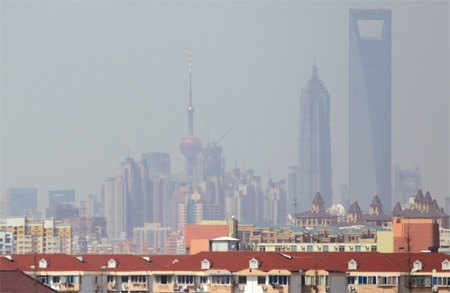Air quality drops after Expo
Updated: 2010-12-01 15:32
By Qian Yanfeng (China Daily)

Haze covers Shanghai's skyline in March before authorities took measures to clean up the air ahead of the Expo. Air quality in the city has now dropped to pre-Expo levels. Provided to China Daily
Shanghai's Pollution index hits high following easing of environmental measures
High levels of air pollution have returned to Shanghai in the past three weeks since the end of the World Expo, with pollution index figures far higher than those recorded during the six-month event.
The city's Air Pollution Index (API) skyrocketed to 370 on Nov 13, the highest level in the past decade, figures from the environment authorities show.
China's environmental standards consider API readings below 50 to indicate "excellent" air quality. API levels up to 100 show "good" air quality and readings above 100 indicate that the air is polluted.
When the index exceeds 300, even healthy people are likely to experience reduced endurance in activities and symptoms of other illnesses. On Nov 13, local environmental authorities advised the elderly and the sick to remain indoors and avoid exercise.
The rising air pollution in the country's financial hub were reminiscent of events two years ago, when Beijing, shortly after successfully hosting the 2008 Olympics, was found polluted for three consecutive days in late September despite marked improvements in air quality during the Games.
Shanghai residents started to complain about poor air only one day after the Expo ended on Oct 31, when the API hit 156 on Nov 1, the highest level since March. Readings for the next day declined to 138 and rose again on Nov 8 to 151.
The latest pollution figures stood in sharp contrast to those recorded during the multi-billion-yuan fair, when more than 98 percent of the days during the Expo enjoyed good air quality.
"It seems that things have returned to normal without much improvement. I guess it is because many of the compulsory measures to fight air pollution have come to an end," Shanghai resident Zhao Yi'an says.
The city's air-monitoring center blamed the worsening air quality on the significant increase in airborne particulate matter brought by sandstorms, which swept across northern China on Nov 11 and carried dust along the way as it traveled southwards.
There are also higher risks of air pollution in Shanghai in winter as cold fronts bring polluted air from inland provinces, the center says.
But many believe the resumption of construction work after the Expo and the easing of pollution controls in suburban and rural areas also contributed to the rise in air pollution.
Many construction sites in the city were told to stop work during the Expo to ensure smooth traffic flow and good air quality. Apart from prohibiting farmers from burning straw, the authorities also cracked down on heavily polluting trucks and placed emission controls on factories in the surrounding region.
Shu Jiong, a climate professor from Shanghai-based East China Normal University, says that although there were "outside influences" on the recent surge in air pollutants, the government still needs to build up a long-term environmental protection mechanism to ensure that hard-earned benefits from the Expo will not be wasted.
"It's about building an integrated system which includes better management over construction sites so that they can control dust emissions, as well as reduce ownership of private cars and encourage public transport," Shu says. Many construction sites are once again affecting air quality by working without adequate preventive measures in place, he says.
"The government should grow out of the mentality in which priority is always given to an ongoing event without real improvement later," he says.
For Yang Qian, a resident in Guangzhou, capital of Guangdong province, the worsening air quality in Shanghai also bodes badly for her city, which is now hosting the 16th Asian Games.
"It's true air has become much better in the run-up to the games, but I have no doubt it will return to what was before as the government has only carried out temporary measures, such as the odd-and-even license plate rule, which allows cars on the roads on alternate days, and a production ban on polluting enterprises," she says.
Still, there a number of people who believe that such measures will pay off in the long run.
"It's true we've had poorer air quality post-Olympics, following the lifting of anti-pollution measures such as the driving ban," Beijinger Zhang Ting says.
"But the air is still much better after many polluting enterprises were shut down or relocated."
Shanghai's environmental authorities say they are stepping up monitoring and supervision and that air quality is likely to get better in the weeks ahead.
Authorities also say that two-thirds of the 28 temporary regulations circulated during the Expo will become permanent to sustain the positive effects of the event. These include those that concern public security, food quality and environmental protection.
E-paper

Ear We Go
China and the world set to embrace the merciful, peaceful year of rabbit
Preview of the coming issue
Carrefour finds the going tough in China
Maid to Order
Specials

Mysteries written in blood
Historical records and Caucasian features of locals suggest link with Roman Empire.

Winning Charm
Coastal Yantai banks on little things that matter to grow

New rules to hit property market
The State Council launched a new round of measures to rein in property prices.
